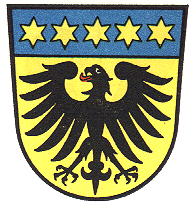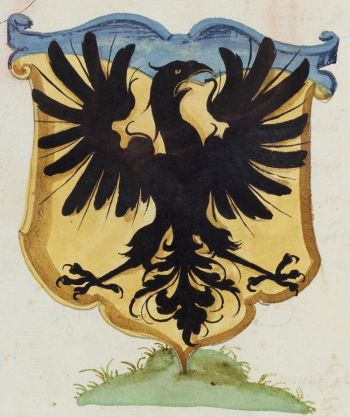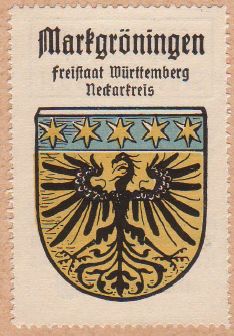Markgröningen: Difference between revisions
Knorrepoes (talk | contribs) m (Text replacement - "|center|Wappen von {{PAGENAME}}]] " to "|center|alt=Wappen von {{PAGENAME}} / Arms of {{PAGENAME}}]] ") |
Knorrepoes (talk | contribs) m (Text replacement - " / Arms" to "/Arms") |
||
| Line 7: | Line 7: | ||
Additions : 1973 [[Unterriexingen ]] | Additions : 1973 [[Unterriexingen ]] | ||
[[File:markgron.jpg|center|alt=Wappen von {{PAGENAME}} / Arms of {{PAGENAME}}]] | [[File:markgron.jpg|center|alt=Wappen von {{PAGENAME}}/Arms of {{PAGENAME}}]] | ||
{| class="wikitable" | {| class="wikitable" | ||
Revision as of 11:47, 2 September 2022
This page is part of the German heraldry portal Deutsche Wappensammlung |
Heraldry of the World |
|
German heraldry:
|
Selected collector's items from Germany:
|
MARKGRÖNINGEN
State : Baden-Württemberg
District (Kreis) : Ludwigsburg
Additions : 1973 Unterriexingen
| German |
Unter blauem Schildhaupt, darin fünf sechsstrahlige goldene Sterne nebeneinander, in Gold ein rot bezungter schwarzer Adler. |
| English | No blazon/translation known. Please click here to send your (heraldic !) blazon or translation |
Origin/meaning
Margröningen was founded as a city in 1240 by Emperor Friedrich II. Until 1336 Markgröningen remained a free imperial city, with the right to use the imperial eagle. In 1336 the city became part of Württemberg. The oldest seal, from 1299, only showed the eagle. Later seals showed a chief without the stars. The stars appeared in the late 16th century. The meaning of the chief and stars is not known. Most likely they were added to differentiate the arms from those of other cities using the imperial eagle.
| The arms in the Chorographia Württemberg (Wolleber, 1591) |
The arms by Hupp in the Kaffee Hag albums +/- 1925 |
Contact and Support
Partners:
Your logo here ?
Contact us
© since 1995, Heraldry of the World, Ralf Hartemink 
Index of the site
Literature : Stadler, 1964-1971, 8 volumes.














